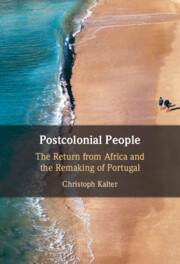Crossref Citations
This Book has been
cited by the following publications. This list is generated based on data provided by Crossref.
Peralta, Elsa
and
Góis, Bruno
2022.
Os Inseparáveis da Huíla: comemoração e nostalgia colonial nos encontros de portugueses retornados de Angola.
Lusotopie,
Vol. XXI,
Issue. 2,
Jaji, Rose
and
Krause, Ulrike
2022.
Exklusives Flüchtlingsschutzregime, koloniale „Andere“ und Geschlechterdichotomien.
Zeitschrift für Friedens- und Konfliktforschung,
Vol. 11,
Issue. 2,
p.
195.
Papadogiannis, Nikolaos
and
Ramos Pinto, Pedro
2023.
Social change, protest and participation in Greece, Portugal and Spain.
Mélanges de la Casa de Velázquez,
Radcliff, Pamela
Kornetis, Kostis
and
Aires Oliveira, Pedro
2023.
The Southern European Transitions to Democracy: A Historiographical Introduction.
Mélanges de la Casa de Velázquez,
Adamson, Fiona B.
2024.
Entangled migration states: mobility and state-building in France and Algeria.
Journal of Ethnic and Migration Studies,
Vol. 50,
Issue. 3,
p.
597.
Gatrell, Peter
2024.
Exile, Asylum and Refugees in Modern European History.
European Review of History: Revue européenne d'histoire,
Vol. 31,
Issue. 4,
p.
660.
Stucki, Andreas
2024.
‘The Angolan Experiment’: Colonial and Post-Independence Rural Social Engineering, 1960s-1980s.
The Journal of Imperial and Commonwealth History,
p.
1.
Rasch, Astrid
2024.
The Palgrave Encyclopedia of Memory Studies.
p.
1.
Peralta, Elsa
and
Góis, Bruno
2024.
Portugueses retornados: memória, cidadania e identidade (pós-)imperial.
Etnografica,
Vol. número especial,
Issue. ,
p.
181.
Reinecke, Christiane
and
Löhr, Isabella
2024.
Beyond the present, the nation, and Europe: Three different uses of history in reflexive migration studies.
Migration Studies,
Vol. 12,
Issue. 3,
Friedrichs, Anne
2025.
The re-making of a Europe of differences: mobile lives and the globalization of categories in revolutionary and post-imperial times (
c
.1770–1970)
.
European Review of History: Revue européenne d'histoire,
Vol. 32,
Issue. 1,
p.
20.



